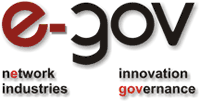eGovernance of the Civil Society
The EPFL Executive Master in e-Governance
Why an Executive Master in e-Governance?
 The EM is presented at http://egov.epfl.ch in details. This one year academic program takes the participants, who are mostly engaged in senior management positions (Chief Information Officers, Chief Technology Officers, heads of IT departments, leaders of public reform committees/ agencies etc.) in a World Tour of prestigious universities to make comparative studies and benefit from the experience gathered by eGov implementations in the different visited countries. The eGov@EPFL Executive Master has alumni in close to twenty countries. The resulting personal network of participants is increased to a unprecedented level with dozens of personal contacts all around the world, not only among the Alumni but also in the visited universities and with high ranking officers in major organizations like the UN and UN agencies like the WHO, the ITU, the World Bank, EU Commissions for example. “The highly networked world of today presents many challenges related to the effective use and management of ICT. Examples abound where ICT are being actively used to transform the very nature of the service delivery and decision-making processes. These give rise to new business, institutional and governance needs, which in turn necessitate a new breed of leaders. The e-Governance Program is specially designed to address these issues with its Multi-Level, Multi-Industry & Multi-Stakeholder approach, which aims to examine how different stakeholders from a variety of industries spanning across local to global levels are able to collaboratively and collectively make use of ICT for transformative innovation and institutional redesign.” Participants of this program acquire skills that enable them to: • Manage complex ICT-related projects and implement organizational changes to improve productivity and service quality; • Master technology infrastructures in both public and private sectors, with a particular focus on ICT-based governance and economics; • Design ICT-based governance mechanism solutions that would have a high acceptability profile; • Apply innovative technology-based solutions for organizational learning, performance measurement and risk management; • Establish and lead specialized e-networks and e-communities; • Ensure the sustainability of ICT-related projects and e-Governance initiatives, with a particular emphasis on ICT for development and inclusion; and • Design and steer strategic partnerships between public sector and private organizations.
The EM is presented at http://egov.epfl.ch in details. This one year academic program takes the participants, who are mostly engaged in senior management positions (Chief Information Officers, Chief Technology Officers, heads of IT departments, leaders of public reform committees/ agencies etc.) in a World Tour of prestigious universities to make comparative studies and benefit from the experience gathered by eGov implementations in the different visited countries. The eGov@EPFL Executive Master has alumni in close to twenty countries. The resulting personal network of participants is increased to a unprecedented level with dozens of personal contacts all around the world, not only among the Alumni but also in the visited universities and with high ranking officers in major organizations like the UN and UN agencies like the WHO, the ITU, the World Bank, EU Commissions for example. “The highly networked world of today presents many challenges related to the effective use and management of ICT. Examples abound where ICT are being actively used to transform the very nature of the service delivery and decision-making processes. These give rise to new business, institutional and governance needs, which in turn necessitate a new breed of leaders. The e-Governance Program is specially designed to address these issues with its Multi-Level, Multi-Industry & Multi-Stakeholder approach, which aims to examine how different stakeholders from a variety of industries spanning across local to global levels are able to collaboratively and collectively make use of ICT for transformative innovation and institutional redesign.” Participants of this program acquire skills that enable them to: • Manage complex ICT-related projects and implement organizational changes to improve productivity and service quality; • Master technology infrastructures in both public and private sectors, with a particular focus on ICT-based governance and economics; • Design ICT-based governance mechanism solutions that would have a high acceptability profile; • Apply innovative technology-based solutions for organizational learning, performance measurement and risk management; • Establish and lead specialized e-networks and e-communities; • Ensure the sustainability of ICT-related projects and e-Governance initiatives, with a particular emphasis on ICT for development and inclusion; and • Design and steer strategic partnerships between public sector and private organizations.
My Comments about eGov@EPFL
‘Having eventually sold both my companies, I decided I had for too long been just an engineer who did not fully grab the social motivations and consequences of engineering work alone. The eGov@EPFL Executive Master appeared clearly as the best arena to allow me to match my long and practical experience with more theoretical and sociological approaches of the present technical revolution we are in. And the result was so impressive that it proved to be far beyond my expectations’.